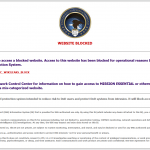
U.S. Cyber Command (CYBERCOM) has blocked access to the Public Intelligence website (publicintelligence.net) as well as at least 2,484 other “WIKILEAKS-related websites” on their unclassified network.
The Department of Defense (DOD) has published the (Final) Environmental Impact Statement (EIS) for the proposed implementation of campus development initiatives and the construction of associated facilities for the National Security Agency (NSA) complex at Fort George G. Meade (Fort Meade), Maryland, dated September, 2010. The National Security Agency/Central Security Service (NSA/CSS) is a cryptologic intelligence agency administered as part of the DOD. It is responsible for the collection and analysis of foreign communications and foreign signals intelligence. For NSA/CSS to continue to lead the Intelligence Community into the next 50 years with state-of-the-art technologies and productivity, its mission elements will require new facilities and infrastructure.
A letter from the Commander of U.S. Cyber Command Keith Alexander to Senator John McCain describing the role of U.S. Cyber Command and its position on current efforts to pass cybersecurity legislation.
Official list of participants for the 2011 Bilderberg Meeting in St. Moritz, Switzerland. The 59th Bilderberg Meeting will be held in St. Moritz, Switzerland from 9 – 12 June 2011. The Conference will deal mainly with Challenges for Growth: Innovation and Budgetary Discipline, the Euro and Challenges for the European Union, the role of Emerging Economies, Social Networks: Connectivity and Security Issues, New Challenges in the Middle East, Conflict Areas, Demographic Challenges, China, Switzerland: Can it remain successful in the future?
The purpose of the Agreement is to set forth terms by which DHS and DoD will provide personnel, equipment, and facilities in order to increase interdepartmental collaboration in strategic planning for the Nation’s cybersecurity, mutual support for cybersecurity capabilities development, and synchronization of current operational cybersecurity mission activities. Implementing this Agreement will focus national cybersecurity efforts, increasing the overall capacity and capability of both DHS’s homeland security and DoD’s national security missions, while providing integral protection for privacy, civil rights, and civil liberties.
Opening Statements
▼Never before has it been possible for one person to potentially affect an entire Nation‟s security.
▼In 1999 (10 years ago), two Chinese Colonels published a book called “Unrestricted Warfare” that advocated “not fighting” the U.S. directly, but “understanding and employing the principle of asymmetry correctly to allow us [the Chinese] always to find and exploit an enemy’s soft spots.”
▼The idea that a less-capable foe can take on a militarily superior opponent also aligns with the views of the ancient Chinese general, Sun Tzu. In his book “The Art of War,” the strategist advocates stealth, deceptionand indirect attackto overcome a stronger opponent in battle.
Cyberspace and its associated technologies offer unprecedented opportunities to the United States and are vital to our Nation’s security and, by extension, to all aspects of military operations. Yet our increasing dependency on cyberspace, alongside a growing array of cyber threats and vulnerabilities, adds a new element of risk to our national security. To address this risk effectively and to sccure freedom of action in cyberspace, the Department of Defense requires a command that posscsses the required technical capability and remains fbcused on the integration or cyberspace operations. Further, this command must be capable or synchronizing wartIghting effects across the global security environment as well as providing support to civil authorities and intemnational partners.